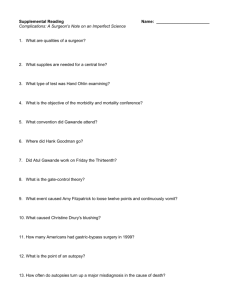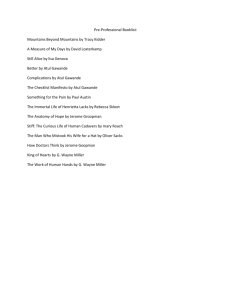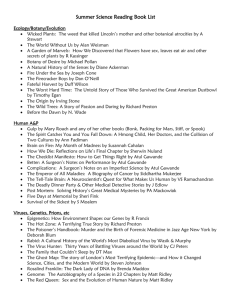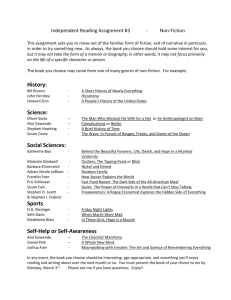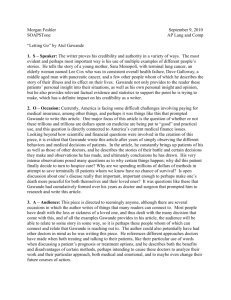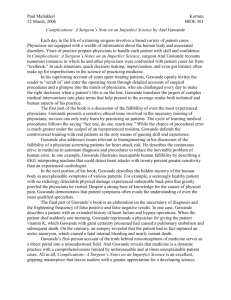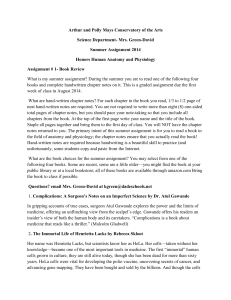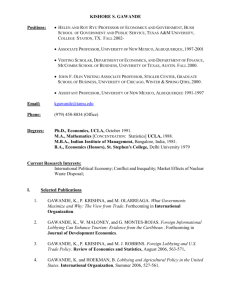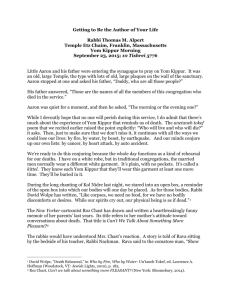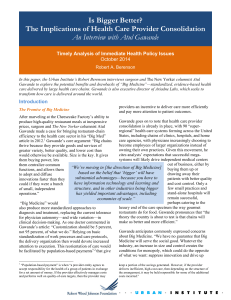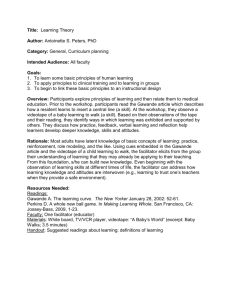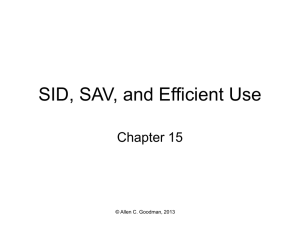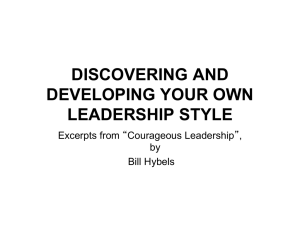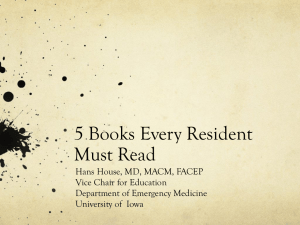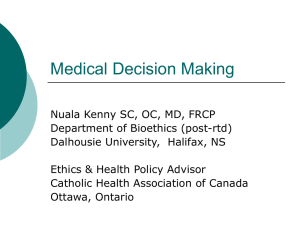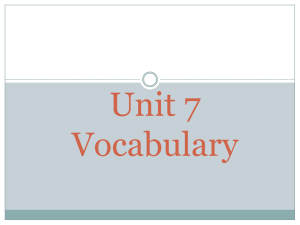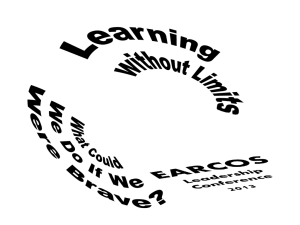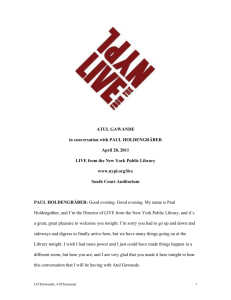Being Mortal Book Discussion Questions
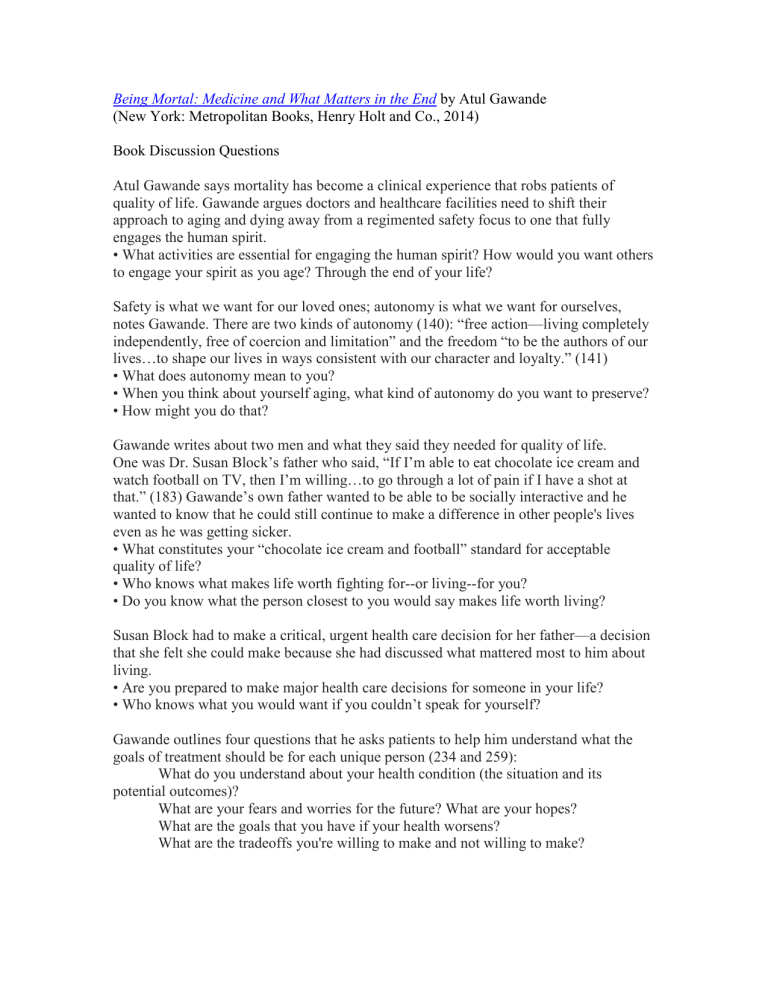
Being Mortal: Medicine and What Matters in the End by Atul Gawande
(New York: Metropolitan Books, Henry Holt and Co., 2014)
Book Discussion Questions
Atul Gawande says mortality has become a clinical experience that robs patients of quality of life. Gawande argues doctors and healthcare facilities need to shift their approach to aging and dying away from a regimented safety focus to one that fully engages the human spirit.
• What activities are essential for engaging the human spirit? How would you want others to engage your spirit as you age? Through the end of your life?
Safety is what we want for our loved ones; autonomy is what we want for ourselves, notes Gawande. There are two kinds of autonomy (140): “free action—living completely independently, free of coercion and limitation” and the freedom “to be the authors of our lives…to shape our lives in ways consistent with our character and loyalty.” (141)
• What does autonomy mean to you?
• When you think about yourself aging, what kind of autonomy do you want to preserve?
• How might you do that?
Gawande writes about two men and what they said they needed for quality of life.
One was Dr. Susan Block’s father who said, “If I’m able to eat chocolate ice cream and watch football on TV, then I’m willing…to go through a lot of pain if I have a shot at that.” (183) Gawande’s own father wanted to be able to be socially interactive and he wanted to know that he could still continue to make a difference in other people's lives even as he was getting sicker.
• What constitutes your “chocolate ice cream and football” standard for acceptable quality of life?
• Who knows what makes life worth fighting for--or living--for you?
• Do you know what the person closest to you would say makes life worth living?
Susan Block had to make a critical, urgent health care decision for her father—a decision that she felt she could make because she had discussed what mattered most to him about living.
• Are you prepared to make major health care decisions for someone in your life?
• Who knows what you would want if you couldn’t speak for yourself?
Gawande outlines four questions that he asks patients to help him understand what the goals of treatment should be for each unique person (234 and 259):
What do you understand about your health condition (the situation and its potential outcomes)?
What are your fears and worries for the future? What are your hopes?
What are the goals that you have if your health worsens?
What are the tradeoffs you're willing to make and not willing to make?
• Thinking about yourself right now, could you imagine answering: “What are the tradeoffs you are willing to make and not willing to make?”
• Do you have a bucket list? If so, what are the top three things on your bucket list?
• How do you think you would respond to a doctor saying: “I can give you longer life if you agree to undergo radiation or chemotherapy, but it may not be the quality of life that you expect or you want”?
Medical care has shifted from the paternalism of “Doctor knows best,” to what Gawande calls the “retail model” of informative medicine, in which doctors say, essentially, “We have option A and option B—which do you want?” (200) Most patients respond to that retail approach with asking the doctor “what would you choose, what would you recommend?”
• Would you prefer the Doctor knows best/paternalistic approach?
• Or would you prefer a “wise counselor” who shares decision making with you?
People have unique and varied priorities for care through the end of life.
• What are your priorities?
• To whom can you express them?
• How can you insure that your priorities will be respected?
• How can we support each other in living according to our priorities into old age and dying—even with physical limitations and knowing that we are mortal?
In Chapter 6, Gawande interweaves the story of Sara Thomas Monopoli, a 34 year old wife and mother of a newborn who is diagnosed with inoperable lung cancer—a type that has a median survival of about a year. The doctors and the patient opt for “aggressively managing” the diagnosis, and Sara undergoes a series of chemotherapies, and painful, invasive treatments (e.g. draining fluid from her lung with a large needle). The cancer spreads, yet no one seems to explain how little time these aggressive therapies may add in terms of time to her life. At one point, the medical team offered “supportive care,” but also offered more experimental treatment.
• Take the role of one of the central characters in this narrative and have a conversation about what to do (Sara, Dr. Marcoux, her husband Rich, her sister Emily, her mother
Dawn).
“People with serious illness have priorities besides simply prolonging their lives.” (155)
(e.g. “avoiding suffering, strengthening relationships with family and friends, being mentally aware, not being a burden on others, and achieving a sense that their life is complete.”)
• What are your priorities?
Gawande discusses the difference between standard medical care and hospice: “The difference was in the priorities. In ordinary medicine, the goal is to extend life.”…Hospice is about “focusing on objectives like freedom from pain and discomfort, or maintaining mental awareness for as long as feasible, or getting out with the family once in a while…” (161)
• How can we build a health care system that will actually help people achieve what’s most important to them at the end of their lives.
According to Stanford professor Laura Carstensen, what we want when we are 45 is very different from what you want when we're 75. (94) When we are younger, we are focused on achieving and getting and having. When we are more aware of the finitude of life, we shift our care to the intimacy of relationships and being connected to loved ones, or making some small, final contribution. She found that older people are actually happier.
They can contain poignancy (a mix of both the negative and the positive at the same time). And depression, oddly enough, goes down in elders unless people are confined or lose autonomy.
“How we seek to spend our time may depend on how much time we perceive ourselves to have.” (97)
• If you had a year to live, how would you spend your time?
Gawande references Plato’s dialogue on courage, observing it takes two kinds of courage to face illness and sickness: “the courage to confront the reality of mortality...” and “the courage to act on the truth we find.” (232)
•What grounds you and supports you in being courageous in the face of difficult realities?
The assisted suicide debate seems to hinge on our fear of making a mistake: “the mistake of prolonging suffering or the mistake of shortening valued life.” (244) Three states in the
U.S. have laws that allow patients to access a lethal prescription they can take at a time of their choosing.
•Should more states enact these laws? What are the benefits? What are the dangers in your mind?
25% of all Medicare spending is for the 5% of patients who are in the final year of life and most of that money goes for care in their last couple of months that is of little apparent benefit. (153)
• If some cancers cannot be cured with expensive chemotherapies, should that patient be obliged to shift to palliative care?
Societally, we are in a transitional phase of how we address aging and how we “face mortality and preserve the fiber of a meaningful life, with its loyalties and individuality.”
(193)
• What support do you feel you need to face your mortality with courage and hope?
Thinking about how a friend or loved one faced aging, frailty, illness, or dying, what would you say was positive about their experience? If their experience was difficult or even traumatic, what so you think may have mitigated their suffering? What do you think you want to do to try to insure that your wishes will be respected as you face aging, illness, or dying?
